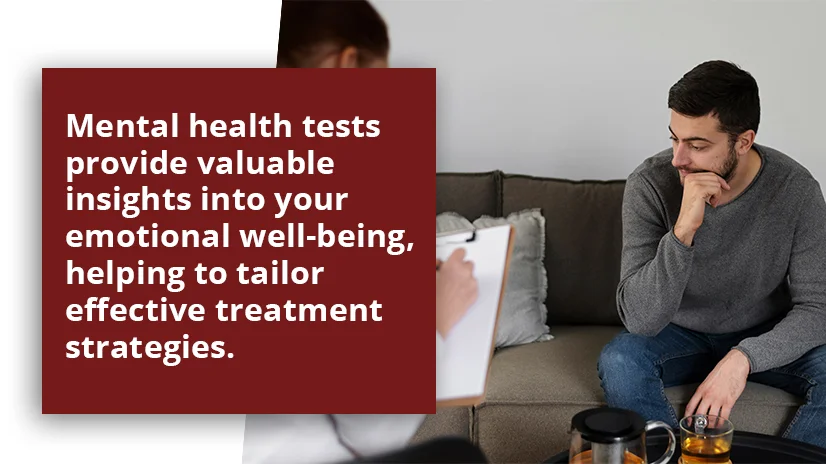
Mental Health Tests For Accurate Diagnosis
Mental health diagnosis is vital for identifying and treating issues early. Accurate diagnosis through mental health tests helps individuals receive appropriate support and care, leading to better outcomes. Early detection can significantly improve one’s quality of life and overall well-being.
Various mental health tests are available, each serving a specific purpose. Continue reading to explore common mental health tests, understand their importance, and learn how to prepare for them to ensure accurate and helpful results.
Key Takeaways
Mental health tests are important for identifying underlying issues and guiding effective treatment plans. Here’s what you should know:
- Various mental health tests are designed to assess specific conditions and concerns.
- These tests help to identify issues early, enabling timely intervention and personalized treatment plans.
- To prepare for mental health tests, ensure you’re honest, well-rested, and clear about your concerns.
Indiana Center for Recovery offers extensive services to diagnose and treat mental health issues. Call us at (844) 650-0064 for details.

Importance Of Mental Health Assessment
Mental health assessments help identify issues early. They provide a clear understanding of a person’s emotional and psychological state. Regular assessments can prevent problems from getting worse. Schools and communities should encourage these evaluations for everyone.
Assessments guide individual treatment plans. They help doctors and therapists create personalized care, ensuring everyone receives the right support. Early detection and mental health treatment improve recovery rates.
Mental health assessments reduce stigma. They promote open conversations about mental well-being. This helps create a supportive environment. Encouraging these assessments shows that mental health is as important as physical health.
Types Of Mental Health Tests
Mental health tests come in various forms to help identify and understand mental health conditions. These tests provide valuable information about a person’s mental state and can guide appropriate interventions. Below are some common types of mental health tests, each with unique purposes and methods.
Self-Report Questionnaires
Self-report questionnaires help people identify mental health problems. They ask questions about moods, behavior, and self-esteem. These screening tools offer instant results, aiding in the early identification of mental disorders.
Psychometric Tests
Psychometric tests measure psychological traits like assertiveness and risk-taking. Doctors use these tests to assess mental health conditions. These tests help in understanding a person’s mental health issues.
Clinician-Administered Assessments
Mental health professionals conduct clinician-administered assessments. They use lab tests and physical exams to evaluate mental health symptoms. These assessments help in accurate diagnosis and timely intervention.
Neuropsychological Tests
Neuropsychological tests check brain function and behavior. They help identify mental illnesses affecting cognitive ability. Examples include tests for memory and problem-solving skills.
Online Screening Tools
Online screening tools are quick ways to screen for mental health issues. They provide resources for self-help and further mental health screening. Apps and online assessments are convenient options for busy people.
Common Mental Health Tests
Mental health tests are vital tools for diagnosing various conditions. From depression to cognitive issues, these tests help doctors evaluate your mental health. Whether you’re experiencing tough times or seeking advice, knowing about these tests can provide clarity and guide you toward the right support.
Depression Screening Tools
Doctors use depression screening tools to identify symptoms and identify concerns early. Common tools include the PHQ-9 and Beck Depression Inventory. Screening is quick, taking just a few minutes. It’s important for children, teens, and adults alike. These tools ask about emotions and daily life impacts.
Anxiety Assessment
Anxiety assessments help diagnose social anxiety disorder and panic disorder. Doctors use these to understand specific concerns. Tests like the GAD-7 assess how anxiety affects your life. They cover topics like physical symptoms and emotional impact. These assessments can be given in person or as online quizzes.
Personality Tests
Personality tests explore your unique traits and can highlight risks for mental health concerns. Doctors use them to understand personal history and concrete skills. Examples include the MMPI and MBTI. These tests help identify bipolar disorder and other conditions. They often involve questions about emotions and relationships.
Cognitive And Memory Tests
Cognitive and memory tests evaluate attention and memory skills. They help identify conditions like autism and dementia. Doctors use them to check for issues during physical exams. These tests are important for children and adults. They help assess trouble with thinking and remembering things. Results can guide advice and treatment plans.
How To Prepare For A Mental Health Test
Preparing for a mental health test starts with talking to your family doctor. They can help you understand what type of test you need, whether it’s an anxiety test, depression test, or another assessment. This is the first step toward getting the right help.
Next, consider reaching out to a mental health provider. They can guide you through the process and help you prepare. They might use a screening test or psychological testing to assess your needs. Make sure to discuss any concerns with them to ensure privacy.
Finally, you can use online assessments or apps for initial screening. These tools offer a convenient way to evaluate your mental health in your daily life. Remember, following up with your doctor or mental health provider for accurate results and addressing fears or risks is important.
Frequently Asked Questions (FAQ)
How accurate are mental health tests?
Mental health tests can vary in accuracy depending on several factors. For example, online assessments and psychological tests may not always reflect true issues. The accuracy can be affected by the person’s mood swings, age, and the app or service’s privacy policy.
While these tests offer a useful starting point, they should not replace professional evaluation. Parents, family members, or friends can help by seeking immediate help. Consider consulting a mental health professional for a thorough assessment and support tailored to individual needs.
Accurate Mental Health Diagnosis Starts with Professional Testing at Indiana Center For Recovery
Mental health tests help detect depression, anxiety, trauma, and other conditions early, so you can get the right care before symptoms worsen. At Indiana Center for Recovery, licensed therapists and psychiatrists use comprehensive mental health treatment programs that begin with thorough assessments tailored to your concerns—whether that’s a questionnaire, psychometric evaluation, or clinician-led interview. Those assessments feed into personalized plans that pair evidence-based therapy with medication management, and when crisis support is needed, inpatient psychiatric services are available while outpatient treatment keeps you connected to care as you return to daily life. Because cognitive and emotional struggles often co-occur with substance use, integrated dual diagnosis treatment ensures both are addressed together.
Our mental health treatment centers across Indiana offer confidential, evidence-based mental health testing followed by structured treatment pathways so you can begin recovery with clarity and confidence. Call us right now at (844) 650-0064 to learn how our team can guide you through testing and a tailored treatment plan.



 100% Confidential
100% Confidential
